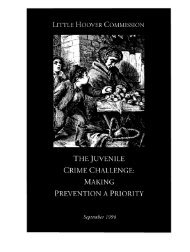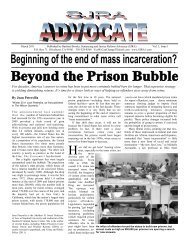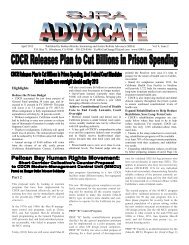Jailhouse Lawyer's Handbook - Sentencing and Justice Reform ...
Jailhouse Lawyer's Handbook - Sentencing and Justice Reform ...
Jailhouse Lawyer's Handbook - Sentencing and Justice Reform ...
You also want an ePaper? Increase the reach of your titles
YUMPU automatically turns print PDFs into web optimized ePapers that Google loves.
elief in the federal courts. While you will learn more<br />
about the PLRA in the following chapters, we have<br />
included a brief outline of its major provisions here so<br />
that you keep them in mind as you start to structure<br />
your lawsuit. Remember that most of these provisions<br />
only apply to suits filed while you are in prison. If you<br />
want to sue for damages after you are released, you will<br />
not need to worry about these rules.<br />
1. INJUNCTIVE RELIEF – This section limits the<br />
“injunctive relief” (also called “prospective relief”)<br />
that is available in prison cases. Injunctive relief is<br />
when you ask the court to make the prison do<br />
something differently, or stop doing something<br />
altogether. Injunctive relief <strong>and</strong> the changes in its<br />
availability under the PLRA are discussed in<br />
Section D of this chapter.<br />
2. EXHAUSTION OF ADMINISTRATIVE<br />
REMEDIES – The PLRA states that “[n]o action<br />
shall be brought with respect to prison conditions<br />
… by a prisoner confined in any jail, prison, or<br />
other correctional facility until such administrative<br />
remedies as are available are exhausted.” 42<br />
U.S.C.A. § 1997e(a).<br />
This is known as the “exhaustion” requirement. If<br />
you try to sue a prison official about anything he or<br />
she has done to you, the court may well dismiss<br />
your case unless you have first filed an inmate<br />
grievance or complaint form provided by your<br />
prison, <strong>and</strong> appealed that grievance all the way up.<br />
You will learn more about exhaustion in Chapter<br />
Three, Section A, Part 2.<br />
3. MENTAL OR EMOTIONAL INJURY – The<br />
PLRA also states that “[n]o Federal civil action<br />
may be brought by a prisoner confined in a jail,<br />
prison, or other correctional facility, for mental or<br />
emotional injury suffered while in custody without<br />
a prior showing of physical injury.”42 U.S.C.A. §<br />
1997e(e).<br />
Most courts agree that this means that if you are<br />
suing for money damages, you can not get money<br />
for mental or emotional injury alone. If you are<br />
suing for injunctive relief or to stop a violation of<br />
your constitutional or federal rights, you do not<br />
need to worry. This rule is explained in detail in<br />
Chapter 2, Section E on money damages.<br />
4. ATTORNEYS’ FEES – As explained in Chapter<br />
One, Section D, the PLRA limits the court’s ability<br />
to make the defendants pay for “attorneys’ fees” if<br />
you win your case. If you do have a lawyer, you<br />
should talk to them <strong>and</strong> have them explain the<br />
significance of this to you. Keep in mind, though,<br />
that the PLRA does not affect any agreement you<br />
may have made with your lawyer to pay fees<br />
yourself.<br />
5. FILING FEES AND THE THREE STRIKES<br />
PROVISION – Courts charge everyone fees when<br />
they file a lawsuit. However, poor people who are<br />
not prisoners are not required to pay all these fees<br />
up front. Chapter Three, Section C, Part 2,<br />
describes how to file “in forma pauperis papers”<br />
which allow poor prisoners to pay their fees on an<br />
installment plan. If you have had three prior<br />
lawsuits dismissed as “frivolous, malicious, or<br />
failing to state a claim for relief,” 28 U.S.C.A.<br />
1915, you may not proceed in forma pauperis <strong>and</strong><br />
will have to pay your fees up front. However, there<br />
is an exception for prisoners who are “in imminent<br />
danger of serious physical injury.”<br />
6. SCREENING, DISMISSAL & WAIVER OF<br />
REPLY – The PLRA allows for courts to dismiss<br />
prisoners’ cases very soon after filing if the case is<br />
ruled “frivolous,” “malicious,” does not state a<br />
claim, or seeks damages from a defendant with<br />
immunity. The court can do this before requiring<br />
the defendant to reply to your complaint. These<br />
provisions are explained in Chapter Four, Section<br />
B.<br />
C. YOUR RIGHTS UNDER THE U.S.<br />
CONSTITUTION<br />
The U.S. Constitution is the supreme law of the l<strong>and</strong>.<br />
The Amendments to the Constitution provide<br />
individuals in this country with certain rights. Within<br />
the U.S. Constitution, the main protection against<br />
actions by state officials is found in the Fourteenth<br />
Amendment:<br />
“No State shall…deprive any person of life,<br />
liberty, or property, without due process of<br />
law; nor deny to any person within its<br />
jurisdiction the equal protection of the laws.”<br />
These guarantees are known as the “Due Process<br />
Clause” <strong>and</strong> the “Equal Protection Clause.” The courts<br />
have ruled that both clauses protect prisoners.<br />
<br />
Equal protection means that prison officials are<br />
not supposed to discriminate against you on the<br />
basis of your race or any other arbitrary category,<br />
such as your religion, nationality, sex, income, or<br />
political beliefs.<br />
JAILHOUSE LAWYERS HANDBOOK – CHAPTER TWO<br />
10





